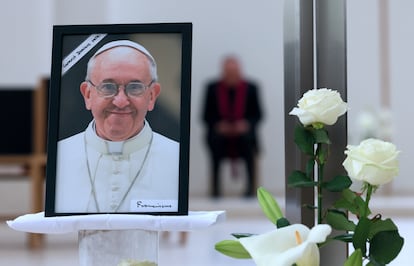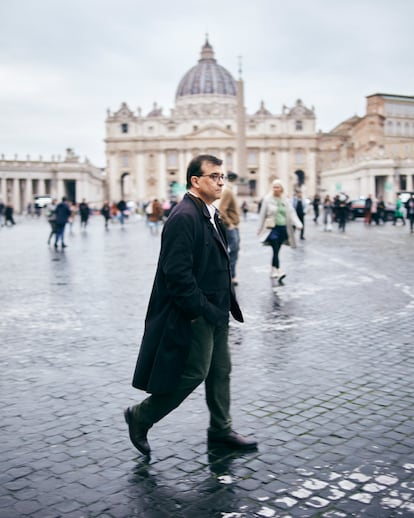For the preparation of your new book, God’s madman at the end of the world (Random House), the writer (Athem) Javier Cercas had free access to the Vatican (by invitation of the Vatican himself) and was able to meet Pope Francis, in whose entourage he joined to make an official trip to Mongolia. He wanted by chance (or the divine design) that, in the middle of the book promotion campaign, and after a few weeks of uncertainty about the health of the Argentine, Jorge Mario Bergoglio has died on Monday. What I wanted to know most was the answer to a question of his mother (a question, otherwise, universal): will he meet, after dying, with his father and together will they enjoy eternal life? The answer, which is promised surprising, is given at the end of the book: we will not make a sword.
Beyond the question of the beyond, fences, during two years of immersion in which he tried to avoid that rationalist, modern and western disdain for the religious fact, has learned a few things about Francisco, about the Church and about the Vatican, which now recalls in telephone conversation.
“After years of pontificate, Bergoglio leaves a different church,” says Cercas, “the word revolution, which is used about that pontificate, I do not think it is exaggerated. It has not touched practically the doctrine (it has not said that the Virgin was not a virgin, for example), but has changed more things than those that seem to the naked eye.” Many times the information surrounding the Pope, especially this Pope who has raised so many passions, with so many enemies in the most reactionary circles, and even branded as “communist”, has to do with politics: his opinions on the war of Ukraine, the slaughter of Gaza or the migratory challenge. But inside the Church other things also happen.
“It does not usually emerge his vision of the Church and Christianity,” says Cercas, who lists some of his most marked positions. For example, anticlericalism: if clericalism is the idea that the clergy is above the faithful, Francisco’s anticlericalism proposes a more horizontal community. “Clericalism has been the cancer of the Church and from there the abuses of power come out, such as sexual abuses,” says the writer. Or for example, the opposition of Bergoglio to Constantinism, that is, to the union of political power and religious power in a single person (called by Constantine, the Roman emperor who, in the year 312, became Christianity). “It is something we have suffered in Spain, not only during Franco, but for centuries in which the priest of the people was always next to living forces,” he adds. Or, to cite a last posture, the synodality (synod), that is, the return to synodalism, to a more assembly structure. “Something like a greater democracy within the Church; a democracy, yes, different from our liberal democracies,” says the writer.
In short, Francisco’s proposal was a return to primitive Christianity, or the original spirit of Christianity. He said just being chosen: I wanted to get the Christ out of the sacristy and put it on the street. Something that is already proposed from the Second Vatican Council (1962-1965), but that for the first time a Pope tried to put into practice. “Christianity is practically the opposite of what we have known as Christianity,” says Cercas, “that was a radical, extreme ideology, the Christianity of the poor, of the unfortunates, of those who have nowhere to fall dead … Christ was a dangerous guy. They crucified him, and the cross was the worst of punishments.” From this point of view, Francisco’s progressive complaints are understood, which, since his arrival in the pontificate, expressed himself against neoliberal capitalism or concerned about ecological issues. And very far from that traditional Catholicism that served to justify and prop up inequalities and oppressions, always on the side of power. “What we have lived is actually a perversion of Christianity,” adds the writer, “and, by this perversion, our phobia of Catholicism is understandable.”
How could a man like Bergoglio get to Pope? “The Vatican is not as we imagine and in the Catholic Church there are people of all kinds,” says Cercas, who was also surprised to know his true nature. “The people I have found in the Vatican are not especially conservative and there are even those who think that Francisco was too conservative.” The revolution described by the writer is slow. It is not like the French Revolution, at the blow of Algarada and Guillotina, but a revolution according to ecclesiastical rhythms: we talk about an institution of more than 2,000 years old that extends throughout the world and that has survived all empires. A recent musical described Jesus Christ as “the eldest influencer of history ”: Some of that is. So Francisco’s work can be seen as a beginning. A beginning that we do not know if he will continue.

What can we venture? “The people who really know, with whom I am in contact in the Vatican, are very prudent. It is not known, there are many cardinals.” One of the fundamental theses around the succession indicates that the world is being flooded by a reactionary wave, that this wave is not in the Bergoglio line and that, therefore, the Church, with its great ability to adapt, will end up aligning in a kind of counterrevolution. Fence is not so clear: “What I say is that it will not be so easy. Why? Because 79% of the cardinals who are going to choose the next Pope have put them Bergoglio.”
In his novel “Without fiction”, Cercas characterizes Bergoglio as the “crazy of God.” He is the first Latin American Pope, Jesuit, who calls himself Francisco by Francisco de Asís, the great defender of the poor. It is the counterfigure. Remember fences to the figure of Nietzsche’s madman, who was with a lantern through the streets announcing the death of God, because we had killed him. “Contrary to what is thought, Nietzsche does not describe that madman as a happy madman, but desolate, because if God does not exist, everything is allowed. All the culture of the twentieth century turns over that absence of God.” During the writing of his book, Cercas had personal access to the madman of God, to the high pontiff. What was Jorge Bergoglio like in closeness? It was easy to talk to the person and not with the Pope? “I have written a book of almost 500 pages talking about that, and it is difficult for me to summarize it. But I can answer what I told my mother when she asked me: it’s like Don Florian, Ibahernando priest, Cáceres (where Cercas was born). The priest who married them.” Cercas went to the end of the world to meet a priest like that of his people. But that, in addition, it was Pope.

